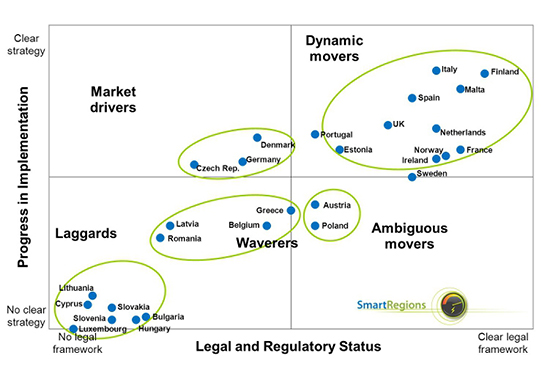European Landscape Report 2012
The SmartRegions project has published the updated Smart Metering Landscape Report 2012. The first report was published in February 2011. The European Landscape report analyses the development of smart metering and metering services in Europe. It consists of updated in-depth country profiles of all EU Member States and Norway and case studies of related services for customer feedback and peak-load shifting.
Due to EU legislation, such as the Energy Services Directive and the 3rd Energy Package, a majority of the countries in Europe already have or are about to implement some form of legal framework for the installation of smart meters. The introduction of Smart Meters is progressing throughout Europe and is on the energy policy agenda in most of the countries. The topic continues to generate heated discussions and has different dynamics in the individual EU member states.
The Landscape Report 2012 depicts the Smart Meter development in each country using a common methodology and displays the different speeds in respect of the topic of Smart Meter. These different speeds and approaches in the Member States are represented through the classification in the following categories: dynamic movers, market drivers, ambitious movers, waverers, laggards. Countries such as Estonia, Finland, France, Ireland, Italy, Malta, Netherlands, Norway, Portugal, UK, Spain and Sweden are „dynamic movers". Most of them have already decided about a mandatory rollout with a specified timetable. „Market drivers" such as Germany, Czech Republic and Denmark have not established legal requirements for a full rollout. There are the obligations for the introduction of smart meter only for a certain category of customers, e.g. in newly built houses and renovated houses. Nevertheless utilities go ahead with the installation of smart meters either because of internal synergetic effects or because of customer demands. The situation in Austria and Poland can be characterized as ambiguous. Although significant progress is visible, there are still some important decisions missing. In the countries called „waverers" first initiatives and pilot projects for the introduction of smart meters have been launched. In the „laggards" countries smart metering is not yet an issue.
For the Landscape Report 2012 the clustering has been made with a modified methodology. The following illustration provides an overview of the legal and regulatory situation and the implementation status in the EU countries and Norway. The assessment of each country takes into account the legal framework, the roll-out plans and the number of existing Smart Meters and their functionalities.

Although the mehodology has been modified, the overall picture is almost unchanged since 2011. The progress was biggest in the countries with a significant regulatory push (dynamic movers). For the most part they have already defined mandatory rollout plans and clarified the minimum functional requirements for smart meters. The analyis of smart metering services has shown that the markets for these services are emerging slowly. But a lot of new insights are avaliable about customer needs and customer satifsfaction from the multitude of pilot projects carried out throughout Europe.
The metering infrastructure is only an enabling technology, which needs to be coupled with innovative services in order to reach better energy management by means of rewards, automation and information. The SmartRegions project focuses on innovative smart metering services (such as informative billing and feedback, variable tariffs and load control services) that are most promising in supporting energy savings and peak load reduction.
Information and feedback tools using smart meter data, such as displays or energy reporting via internet mobile devices are already available. A number of utilities test and operate demand response and direct load control programmes in order to limit and shift the power peak load. The Landscape Report 2012 gives an actual description of these real-life implementations and trials of innovative end-user services, that are completed or in progress.
Only with smart services the smart meters will provide added value to the customer. This added-value is required to reach customers' support and engagement in energy efficiency and demand response activities. This support is particularly important because of the real advantages of smart metering will be and have to be compared with the related costs that will be borne by customers.
SmartRegions supports innovative metering services
The goal of SmartRegions is to promote innovative smart metering services that have the potential to achieve energy savings and peak load reduction in all Member States. In order to do so, this report collects information on the situation of smart metering throughout Europe.
The European Smart Metering Landscape Report is a Deliverable of the project "SmartRegions – Promoting best practices of innovative smart metering services to European regions” funded by Intelligent Energy – Europe.
Downloads:
